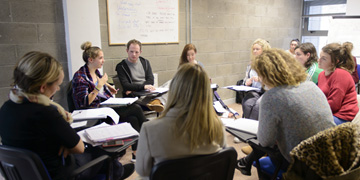In accordance with Code of Practice for Employers and Employees, Right to Request Remote Work (the Code of Practice) and the policy, the agreed working arrangement can be terminated in certain circumstances, before or after it has started, if it becomes apparent that the working arrangement would have, or is having, a substantial adverse effect on the operation of the School or Unit because of:
- seasonal variations in the volume of the work concerned, or
- the unavailability of a person to carry out the duties of the employee in the employer’s place of business (namely University campus and associated sites), or
- the nature of the duties of the employee in the employment, or
- any other matters relevant to the substantial adverse effect on the operation of the School, Unit, University or student needs.
In such circumstances, the Head of School/Unit/Line manager can give an employee written notice of termination of an arrangement after considering the following:
- the needs of the University and students;
- the reasons put forward by the employee when applying for the hybrid working or a remote working arrangement; and
- the requirements of the Code of Practice for Employers and Employees, Right to Request Remote Work (the Code of Practice) in relation to considering termination.
The notice will set out the reasons for termination and specify the date on which the employee must return to their original/contractual working arrangement. This date will not be earlier than 4 weeks from the date of receipt of the notice of termination. unless the date the approved hybrid working arrangement comes to an end, is less than 4 weeks from the date of receipt of the notice.
Where the Head of School/Unit/Line manager proposes to give notice of termination, the following will apply:
- the employee will be notified in writing of the proposal to terminate the arrangement, and
- The employee will be provided with details of the grounds for terminating the arrangement, and
- The employee will be given a minimum of 7 working days after receipt of the notice to make representations to the line manager in relation to the proposal. The employee will be given the option to respond in writing or in person and
- the line manager will consider the response made by the employee before deciding whether to give notice of termination.
When considering termination of a hybrid working arrangement (including an exceptional request) the Head of School/Unit/Line manager will consider if the reasons for terminating the arrangement are objective, fair and reasonable. The grounds for the decision will be set out in a clear manner in the notice to help the employee understand why the arrangement is being terminated and that the decision has been given consideration. The Head of School/Unit/Line manager will also consider in an objective, fair and reasonable manner any representations made by the employee after they have received the notice.
Where possible, the Head of School/Unit/Line manager will engage with the employee to consider whether any alternative arrangements other than termination may be feasible depending on the particular circumstances of the individual case. If the Head of School/Unit/Line manager decides to proceed with terminating the arrangement, the employee must return to their original/contractual working arrangement on the date stated in the notice.
Employees with an agreed hybrid working arrangement may also choose to return to 100% campus-based working and should discuss with their line manager if they wish to adjust their hybrid working arrangement. This does not preclude applying for a hybrid working arrangement again at a future date.





